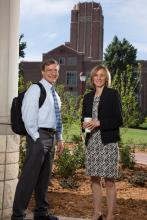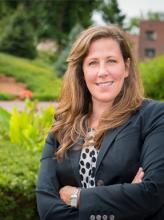Faculty and Staff Grants from July 2020

Congratulations to the following faculty and staff members who received grants and awards in July 2020.
Anne Coats Amati, coordinator of the Native American Graves and Repatriation Act (NAGPRA) program and adjunct professor in the Department of Anthropology at the College of Arts, Humanities and Social Sciences
- Grant from the National Park Service (NPS) for "NAGPRA Community of Practice"
- Project abstract: The goal of this agreement is to allow NPS to develop specific task agreements to assist in carrying out the public purpose of the NPS National NAGPRA Program. This community of practice is intended for Indian Tribes, Alaska Native villages, Native Hawaiian organizations, museums, institutions, state and local government agencies, academics, attorneys, collectors, artists, cultural preservationists and others engaged or interested in the repatriation of Native American cultural items. Together, we will critically analyze the future of NAGPRA and learn how to advance its implementation across disciplines, while gaining a better understanding of repatriation in the U.S. and abroad.
Gary Bishop, senior research engineer in the Department of Chemistry and Biochemistry at the College of Natural Sciences and Mathematics
- Grant from the Coordinating Research Council for "Fresno California Light-duty Vehicle Emission Measurements"
- Project abstract: The Central San Joaquin Valley is an area in California that regularly exceeds National Ambient Air Quality Standards for particulate matter and ozone. The University of Denver visited Fresno, Calif. in March 2008 and collected seven days of measurements. This project will deliver a report that details the newest measurements and compares and contrasts them to the 2008 measurements and an emissions database that contains 10,000–15,000 vehicle emission measurements and vehicle registration information.
Douglas Clements, distinguished professor and Kennedy Endowed Chair in Early Childhood Learning at the Morgridge College of Education; and co-executive director of the Marsico Institute of Early Learning and Literacy
Traci Kutaka, research associate at the Marsico Institute for Early Learning and Literacy at the Morgridge College of Education
Julie Sarama, distinguished professor and Kennedy Endowed Chair in Innovative Learning Technologies at the Morgridge College of Education and co-executive director of the Marsico Institute of Early Learning and Literacy
- Grant from the Institute of Education and Science (IES) for "The Evolution of Learning Strategies as Indicators of Intervention Efficacy"
- Project abstract: This project will explore the evolution of how children learn to use arithmetic problem-solving strategies over the course of an intervention. If successful, this study will serve as a demonstration of the kinds of data that should be collected with respect to children's experiences within interventions and the comprehensive analyses that could be carried out to better understand the impact of instruction on children's development of problem-solving strategies and, ultimately, higher levels of thinking along learning trajectories.
Rui Fan, assistant professor in the Department of Electrical and Computer Engineering at the Ritchie School of Engineering and Computer Science
- Grant from Battelle National Labs, subaward from the Department of Energy for "Learning to Adapt and Control for Complex Power Systems"
- Project abstract: Traditional power system controller parameters are manually tuned and evaluated in simulations, assuming the system has large inertia and its dominant eigenmodes do not vary significantly over time. However, with the increasing dynamics and stochastics in power grids, the traditional stationary controllers cannot guarantee the stability and resilience of the power grid. To solve this challenge, a cutting-edge deep learning-based approach has been proposed to better tune the controller parameters.
Amin Khodaei, professor in the Department of Electrical and Computer Engineering at the Ritchie College of Engineering and Computer Science
- Grant from Commonwealth Edison Company, subaward from the Department of Energy for "An Energy Internet Platform for Transactive Energy and Demand Response Applications"
- Project abstract: Advances in renewable energy technologies such as PV panels, battery storage, smart devices, as well as financing models and increasing concerns about greenhouse gas emissions have given rise to "prosumers:" electricity consumers that produce energy from rooftop PV while also consuming from the grid. Prosumers are interested in monetizing the value of their investment/production while regular consumers desire cheaper electricity prices. However, there are no widely available and effective tools to facilitate customer involvement in today's energy market. This project plans to enter the emerging market of Peer-to-Peer (P2P) energy trading by expanding capabilities of the WiseBldg platform — an open-architecture solution capable of remote monitoring and control of various Internet-of-Things (IoT) devices targeted for building energy management.
Whitney LeBoeuf, director of data integration and analytics at the Colorado Evaluation and Action Lab at the Barton Institute for Philanthropy and Social Enterprise
- Grant from the Colorado Department of Human Services for "Office of Early Childhood Data Support"
- Project abstract: This work is to support the rebuild of the Office of Early Childhood's workforce data system moving forward. We will be analyzing their historical data from their existing system to ensure only quality data are migrated into the new system that will support future research on the early care and education workforce in a subsequent research project.
Daniel Linseman, associate executive director at the Knoebel Institute for Healthy Aging, and professor in the Department of Biological Sciences at the College of Natural Sciences and Mathematics
- Grant from Resilience Code, LLC for "Collaborative Studies on TBI Between the Knoebel Institute for Healthy Aging and Resilience Code"
- Project abstract: A significant body of evidence suggests that exposure to either a single moderate-to-severe traumatic brain injury (TBI) or repetitive incidences of mild traumatic brain injury (mTBI; a.k.a. concussion) early in life contributes to the development of neurodegenerative disorders later in life. Investigators at the Knoebel Institute for Healthy Aging (KIHA) at the University of Denver are currently using mouse models and prospective studies in collegiate athletes to investigate the connection between (repetitive) mTBI and AD, ADRD and CTE. These studies focus on determining the long-term brain health effects of repetitive mTBIs in athletes.
Brenda Lockwood, senior program associate at the Butler Institute for Healthy Families
- Grant from Kinnect Ohio for "Kinnect YCPRT Coaching Supports"
- Project abstract: The Butler Institute will support Kinnect Ohio Youth-Centered Permanency Round Tables team. Butler will customize a YCPRT Tracking and Tool/form to systematically assess and track site and facilitator progress, and deliver nine site plans and 26 facilitator plans, including providing Coaching the Coach support, prep work, evaluation session/meeting and post work.
Kevin Morris, research associate professor at the Graduate School of Social Work, affiliated with the Institute for Human-Animal Connection
- Grant from the William and Charlotte Parks Foundation for Animal Welfare for "Pets for Life as One Health Study"
- Project abstract: The future of companion animal welfare is becoming increasingly contingent upon its ability to serve as a resource for all pets in the community, not just those who end up at a shelter. To achieve transformational change, the field of animal welfare must adapt to work effectively at the community level by recognizing that the health of humans, animals and the environment are intimately interconnected within the One Health framework. This study has the potential to dramatically change the landscape of animal welfare by looking at how community outreach and pet owner support programming benefits companion animals, humans and the larger society.
Lavita Nadkarni, professor and associate dean at the Graduate School of Professional Psychology
- Grant from Jefferson County School District R-1, subaward from the Department of Justice for "Improving Community Reentry in Jefferson County — DU Contracted Services"
- Project abstract: This project will provide consultant services to do external research for grant-funded reentry mental health programming.
Cecilia Orphan, assistant professor at the Morgridge College of Education
- Grant from the University of North Carolina-Wilmington, subaward from the Joyce Foundation for "Project With UNCW"
- Project abstract: The purpose of this project is to develop a policy brief that makes the case for federal intervention to support broadly accessible, rural-serving postsecondary education institutions. The brief will advocate for federal support for these institutions to ensure their survival through several forward-thinking policy recommendations.
Jesse Owen, professor in the Department of Counseling Psychology at the Morgridge College of Education
- Grant from Boston University, subaward from the John Templeton Foundation for "Therapist Flourishing in Psychotherapy"
- Project abstract: This project will examine the process of psychotherapy at a variety of psychotherapy centers across the U.S. It will examine whether a machine learning device can be programmed to detect moments of flourishing in psychotherapy sessions. It will also examine whether providing feedback to therapists about their flourishing could increase their engagement in their job. Lastly, we will also explore whether therapist flourishing changes over time (e.g., during the day, week, month, etc.).
















